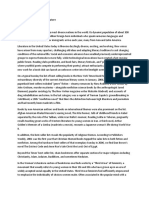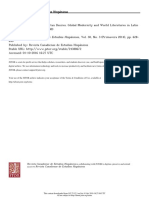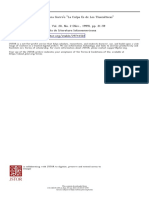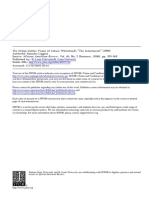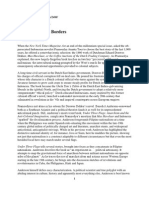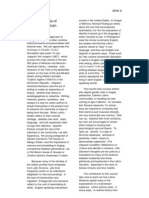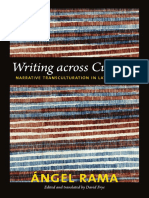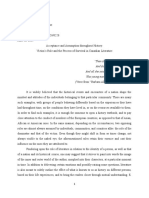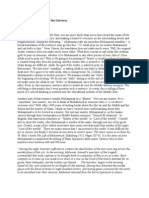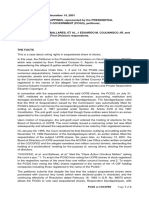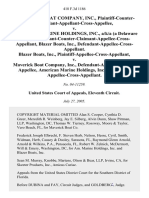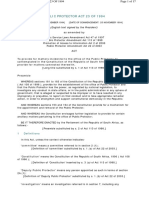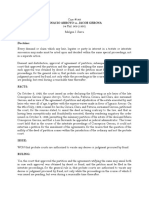This Content Downloaded From 78.174.0.71 On Wed, 01 Jun 2022 19:32:56 UTC
This Content Downloaded From 78.174.0.71 On Wed, 01 Jun 2022 19:32:56 UTC
Uploaded by
anaiel nymviaCopyright:
Available Formats
This Content Downloaded From 78.174.0.71 On Wed, 01 Jun 2022 19:32:56 UTC
This Content Downloaded From 78.174.0.71 On Wed, 01 Jun 2022 19:32:56 UTC
Uploaded by
anaiel nymviaOriginal Title
Copyright
Available Formats
Share this document
Did you find this document useful?
Is this content inappropriate?
Copyright:
Available Formats
This Content Downloaded From 78.174.0.71 On Wed, 01 Jun 2022 19:32:56 UTC
This Content Downloaded From 78.174.0.71 On Wed, 01 Jun 2022 19:32:56 UTC
Uploaded by
anaiel nymviaCopyright:
Available Formats
Coding the Immigrant Experience: Race, Gender and the Figure of the Dictator in
Junot Diaz's "Oscar Wao"
Author(s): Fremio Sepulveda
Source: Journal of Caribbean Literatures , Spring 2013, Vol. 7, No. 2 (Spring 2013), pp.
15-33
Published by: Maurice Lee
Stable URL: https://www.jstor.org/stable/43672608
JSTOR is a not-for-profit service that helps scholars, researchers, and students discover, use, and build upon a wide
range of content in a trusted digital archive. We use information technology and tools to increase productivity and
facilitate new forms of scholarship. For more information about JSTOR, please contact support@jstor.org.
Your use of the JSTOR archive indicates your acceptance of the Terms & Conditions of Use, available at
https://about.jstor.org/terms
is collaborating with JSTOR to digitize, preserve and extend access to Journal of Caribbean
Literatures
This content downloaded from
78.174.0.71 on Wed, 01 Jun 2022 19:32:56 UTC
All use subject to https://about.jstor.org/terms
Coding the Immigrant Experience: Race, Gender and the Figure
of the Dictator in Junot Diaz's Oscar Wao
Fremio Sepulveda
University of Buffalo
So I was thinking about how in the world to describe the ex-
treme experience of being an immigrant in the United States, the
extreme experience of coming from the Third World and suddenly
appearing in New Jersey. . . . science fiction, fantasy, and comic
books are . . . meant to talk about these extreme, ludicrous trans-
formations, and so I really wanted to use them, I felt a great kin-
ship to these narratives, which served as a backbone for so much
of what we call "America" but are completely ostracized; it felt
like the history of the immigrant, the minority, the woman.
-Junot Diaz, "In Darkness We Meet"
In 1982 when Gabriel Garcia Marquez delivered his Nobel Prize speech titled
"La Soledad de América Latina," he spoke of the insufficiency of language
capture a "disproportionate" Latin American history and the inability of a Eur
centric epistemological frame to ever adequately represent the struggles of Lati
Americans. According to Márquez, conventional European paradigms, instead o
making Latin America intelligible to the rest of the world, prevent Europe an
North America from comprehending Latin America as a product of its own live
historical experience, and as a result render the region even more unknowable
Marquez alludes to dictators like Maximiliano Hernandez Martinez, who ordere
the massacre of thousands of peasants in El Salvador, and to the civil unrest affe
ing much of Latin American history since the beginning of colonialism in order
emphasize the region's unique, and often tumultuous, politico-historical trajector
which poses an immense challenge to Latin American writers who strive to conv
a reality without "conventional means [by which] to render our lives believable.
This search for novel means to adequately represent the experiences of a peop
informs Junot Diaz's The Brief Wondrous Life of Oscar Wao, a novel that frustrates
facile genre categorization; Diaz's novel formally echoes the marginal status of
"low" mainstream genres to the "high" literary forms as analogous to the pos
tion of the marginal and immigrant Cabral family to the dominant and normati
Anglo-Saxon U.S. society.
I begin this essay by first situating Diaz as a Dominican- American writer in
long tradition of diasporic Latino writing. Then I seek to construct an intertext
reading of the novel to unpack the significance of Diaz's use of other literary texts,
particularly J.R.R. Tolkien's Lord of the Rings and Jack Kirby's and Stan Lee'
Fantastic Four. I argue that Diaz strategically adapts them to construct a narrat
that intervenes in Dominican history to critique and subvert the official nation
This content downloaded from
78.174.0.71 on Wed, 01 Jun 2022 19:32:56 UTC
All use subject to https://about.jstor.org/terms
16 Journal of Caribbean Literatures
discourses of Trujillo's repressive political regime and to represent his characters
as heroic survivors. By reading the novel in relation to the work of Caribbean
scholars like Silvio Torres-Saillant and Frantz Fanon, I examine how Diaz's nar-
rative calls to question his community's troubling adherence to machismo values
and a European racial aesthetic. While I aim to contribute to the scholarly discus-
sion of The Brief Wondrous Life of Oscar Wao as an "anticolonial" and subversive
"comic" novel bridging U.S. pop culture with Latin American literary traditions,
I also seek to redress the lack of attention given to the novel's representation of
women. Therefore, I will specifically examine how the novel constructs the matri-
arch's experience of state-sponsored violence as an event written on her body and
beyond textual representation. Ultimately, I argue that while the novel attempts to
give voice to a fragmented history of repressive political violence on a family and
a nation, it also problematically subsumes the matriarch's gendered subjectivity
under the narrative of a male narrator who degrades women to foreground his own
masculine identity.
Fighting a Colonial Legacy: Imperialist Languages and Race
What really happens is that the story maker proves a successful
"sub-creator." He makes a Secondary World which your mind can
enter. Inside it what he relates is "true." It accords with the laws
of that world. You therefore believe it, while you are, as it were,
inside. (Tolkien 37)
Like most of the critical commentators on the novel, Alice O'Keefe's review
in The New Statesman lauds Diaz's novel for its ability to adeptly switch from
the vernacular to the academic, for its fusion of multiple linguistic registers and
cultures:
With its flights of surreal fantasy and its streetwise attitude,
Oscar Wao belongs to a generation of Latin American-influenced
writing that, to paraphrase Diaz, is "more McOndo than Macon-
do." A product of the lives of Latinos in the US, who are increas-
ingly self-confident and culturally influential ... It straddles two
cultures and two languages: Diaz writes in zinging, muscular
Spanglish. ... He has an embarrassment of verbal riches to draw
on: the precision of English, the rhythm and playfulness of Carib-
bean Spanish. (58)
O'Keefe praises the novel's narrative voice for transcending, while drawing
from, a multiplicity of transnational sources, that is, interconnecting Latin Ameri-
can and U.S. cultural and literary traditions, languages, and histories. Yet her dep-
recatory classification of the employment of Spanish within Diaz's novel situates
it as a minor language of affect, as simply "rhythm." In contrast, I view Diaz's
writing in Spanglish as fundamental to his linguistic politics. He writes from the
This content downloaded from
78.174.0.71 on Wed, 01 Jun 2022 19:32:56 UTC
All use subject to https://about.jstor.org/terms
Coding the Immigrant Experience 17
perspective of a Latino author who represents in his writing how working-class,
Afro-Dominicans negotiate the rupture of involuntary migration prompted by eco-
nomic hardship and political oppression. Diaz, like Dominican author Julia Al-
varez, uses his writing to produce stories about Dominicans struggling with the
legacy of Truj ilio 's dictatorship and the obstacles posed by migration; but while
Alvarez writes about privileged Dominicans, Diaz's writing represents the socially
and economically marginalized.
Diaz's novel can be seen as the cultural product of multiple literary, theoreti-
cal and cultural influences: Latin American, Latino/a writing, and African Ameri-
can literature and culture. Diaz's writing innovatively prizes Spanglish as a valid
means of communication that is not unlike James Baldwin's (1979) assertion of
Black English as a legitimate idiom used by a minority group to articulate their
world and "to describe and thus control their circumstances ... in order not to
be submerged by a reality that they cannot articulate." Baldwin's assertion reso-
nates with what Gabriel García Márquez's expresses in his Nobel speech as the
overwhelming solitude of Latin Americans disadvantaged by the traditional liter-
ary tools of the metropoles. Consequently, Latin American authors have been left
with the herculean task of charting novel literary trajectories. Like the world of
Macondo that Garcia Marquez creates in One-Hundred Years of Solitude, Diaz's
TBWL abounds in literary and cultural references, and merges seemingly incom-
patible paradigms and artistic forms, from the "low" literary, from comic books
and fantasy novels to allusions to Grecian tragedy in order to represent multiple
generations of an immigrant Dominican family struggling with the complexities of
familial and national struggles, race, language, gender, and psychosocial develop-
ment; the novel combines English and Dominican Spanish to represent how many
bilingual Latinos express their quotidian lived experience as bicultural subjects.
For Rolando Pérez every Latino author who picks up the pen engages with a two-
fold politically charged struggle, on the one hand with English as the language of
the dominant U.S. society and on the other hand with Spanish as another colonial
tongue; Pérez asserts that every Latino writer who consciously publishes in two
tongues engages in the politically revolutionary and decolonizing power of La-
tino writing: "Every Latino/a writer knows that just as his/her confrontation with
English represents a lucha, a political struggle with the language of her/his present
economic marginalization, the confrontation with Spanish is no less political - that
being a struggle against the language of empire" (95).
Following along this literary tradition, Diaz narrates in a bilingual format that
reflects his non-assimilationist approach as a Latino author whose use of Span-
glish is indicative of his anti-colonial lucha or struggle against linguistic imperial-
ism from within two major languages of the Americas, Spanish and English. By
refusing to italicize and translate Spanish, Diaz's writing refuses to smooth out
differences in order to make his work easily digestible for Anglophone readers
who simply want easy, already clarified exposure to other, "exotic," cultures. In the
United States the relationship between Spanish and English reflects a long history
of asymmetrical power relations between colonized Spanish-speakers and the An-
This content downloaded from
78.174.0.71 on Wed, 01 Jun 2022 19:32:56 UTC
All use subject to https://about.jstor.org/terms
18 Journal of Caribbean Literatures
glo-dominant society and its disciplinary institution. Aware of the prohibition and
punishment of Spanish-speakers within the classroom and the larger U.S. society,
Diaz expresses in an interview that his writing is indeed politically motivated by
his personal experience as an immigrant who gained English at the expense of his
mother tongue. For Diaz to translate and mark Spanish as minor would contradict
both the centrality of Spanish in his writing and the status of Spanish as a major
language of the western hemisphere: "Spanish is not a minority language. Not in
this hemisphere, not in the United States, [and] not in the world inside me head. So
why treat it like one. Why 'other' it?" (904).
By claiming Jose Marti as an avant-garde figure in diasporic Latino writing,
Laura Lomas' writing makes possible tracing the development of this literary tra-
dition as far back as the 19th century. According to Laura Lomas, Marti 's writing
sets out to battle dominant languages through articulating how Spanish has been
remade and given new meaning in Latin America. For example, Lomas notes how
Marti catalogues in one of his early manuscripts new Latin American words, as in
la caña to refer to "a great difficulty to be overcome in Santo Domingo" which
leads her to conclude that: "By breaking and remaking the existing rules that gov-
ern these words' meaning, his [Marti 's] America had appropriated and reinvented
the significance of a colonial language" (29). Similarly, Diaz writes in an American
English that he sets to a new tune by infusing it with a distinctly Dominican Span-
ish speech and rhythm. Consider for example how back in the Dominican Republic
Lola jokingly points out to her mother that she has attracted the gaze of the waiters
because "they probably think you Haitian" to which Beli retorts "La unica haiti-
ana aqui eres tu, mi amor"(276). While Beli's comment can at surface appear as a
simple deflection, its troubling racial content reveals a deep-rooted anti-Haitianist
discourse at the heart of racial identification within the Dominican community.
Diaz's novel eschews the conventional immigrant narrative tropes of upward
mobility and assimilation for a discontinuous storyline consisting of episodes that
alternate between the Dominican Republic during El Trujillo's rule and the mod-
ern-day lives of the Cabral family in New Jersey. The novel shows how unlike Eu-
ropean immigrants who could easily assimilate into white, mainstream America,
for recent, predominantly black Caribbean arrivals, coming into the U.S. almost
always translates into relocating into ethnic enclaves where they encounter stag-
nant socio-economic prospects and similar racial constraints and struggles similar
to those of black Americans, whose racial otherness is essential to the reproduction
of whiteness. Unlike elite Dominican authors who have since colonialism stressed
the Dominican Republic's Hispanic heritage and white ancestry "to obscure the
overwhelming reality of African presence" (Torres-Saillant, Caribbean Poetics
48), Diaz's novel ruptures this cultural tradition by foregrounding his characters
Afro-Dominican identity. The narrative signals an interest in stressing Oscar as
an anti-hero, a Dominican nerd engrossed by his avid interest in comic books,
fantasy and role-playing games, but fundamentally an outcast because of his dark
complexion: "You really want to know what being an X-Men feels like? Just be a
smart bookish boy of color in a contemporary U.S. ghetto" (22). As in his much
This content downloaded from
78.174.0.71 on Wed, 01 Jun 2022 19:32:56 UTC
All use subject to https://about.jstor.org/terms
Coding the Immigrant Experience 19
acclaimed Drown, Diaz narrates TBWL through the voice of Yunior, a figure who
embodies the stereotypical Dominican machismo that Oscar wishes to emulate and
who also constantly subjects Oscar to ridicule and racist epithets. For example,
Yunior, who only befriends Oscar out of interest for his sister, Lola, demonizes
him because of the color of his skin: "Unlike me who would have hidden from a
Caliban like that, she [Lola] loved the dork" (171). By making Yunior the one who
marks Oscar as "Caliban," Diaz positions the narrator as the oppressive creator
figure in his novel, as Prospero, while Oscar, in turn, figures as the dehuman-
ized and colonized Other. Like Prospero from Shakespeare's The Tempest, Yunior
places himself as the authority within a master/slave binary that recalls a history
of European domination and exploitation of the Caribbean, and while Diaz's novel
focuses on the story of a modern-day family in diaspora it also clearly has an inter-
est in emphasizing the long and complex colonial history that has given rise to a
community's self-destructive allegiance to colonial relations and paradigms.
Whereas Silvio Torres-Saillant embraces Caliban as a figure of hope for the
Caribbean, Diaz's novel resists the unequivocal association of hope with the Do-
minican diaspora to the United States. Rather than confirm Torres-Saillant's hope
that Caliban, as a symbolic figure of Caribbean decolonialism, may undergo a
sort of spiritual rebirth that might put him on the path to a "restorative future"
{Intellectual History of the Caribbean 229), Diaz's narrative opposes the roman-
ticized notion of migration as a linear trajectory toward progress and immanent
wealth. Rather, his depiction of the Dominican community reveals how Domini-
cans within the U.S. perpetuate the home country's anti-Haitianist racial discourse,
which is further complicated by a bipolar racial grid within the U.S. that tends to
homogenize Latino communities to a simplified black or white dichotomy despite
vast ethno-racial differences.1 In brief, Dominicans, who perceive that only Hai-
tians count as black subjects, ironically become subject to anti-black prejudice
upon arriving in U.S. shores. The Dominican Republic is, however, certainly not
alone in its repression of the importance of its African heritage, the U.S., as author
and critic Toni Morrison expresses in Playing in the Dark, has historically used
an "Africanist presence" to ideologically maintain and foreground an image of
itself as an individualistic, stable, and white nation-state.2 According to Morrison,
this "Africanist presence" within U.S. literature and culture acts as a potent liter-
ary tool, serving effectively as a means for "contemplating chaos and civilization,
desire and fear, and [as] a mechanism for testing the problems and blessings of
freedom" (7). As a consequence, a deeply amnesiac U.S. society problematically
conceals the intrinsic importance of the black experience and culture to its eco-
nomic and social construction. Furthermore, in the late 19th century, when North
American imperialism aimed to annex strategic land in the Caribbean, this domes-
tic contempt and erasure of blackness facilitated the racist rhetoric of the U.S.,
which propagated the alleged instability of self-governing mestizo or mixed-blood/
multi-cultural Caribbean societies as a means to support invasion and occupation
of other sovereign states. Within the Dominican Republic specifically, U.S. anti-
black rhetoric fueled an already entrenched disdain for blackness within the upper
This content downloaded from
78.174.0.71 on Wed, 01 Jun 2022 19:32:56 UTC
All use subject to https://about.jstor.org/terms
20 Journal of Caribbean Literatures
echelons of Dominican society.
Diaz's narrative emphasizes the overwhelming colonial/neo-colonial history
shaping contemporary life for Dominicans unable to find in diaspora a "restor-
ative" future unburdened by long-standing racial hierarchies and colonial rela-
tions. As the novel's tragic hero, Oscar is doubly stigmatized, as a dark-skinned,
overweight Dominican who embodies a different kind of masculinity at odds with
the stereotypical, highly sexualized notion of what a Dominican male must repre-
sent. In turn, his community ostracizes him, which effectively subjects him to an
epistemological violence: his failure to conform to a model of masculinity based
on accruing and objectifying women leads others to deprecate him for being alleg-
edly "un-Dominican." To be a Dominican male is therefore equivalent to uphold-
ing the values of a hypersexual masculinity which Oscar indeed fails to embody.
Nor can he claim identity within the larger Anglophone community which also
resists affirming his humanity. As the following example illustrates, his racial ap-
pearance and bodily movement become crucial markers for determining and deny-
ing identity:
The white kids looked at his black skin and his afro and treated
him with inhuman cheeriness. The kids of color, upon hearing him
speak and seeing him move his body shook their heads. You're
not Dominican. And he said over and over again, but I am. Soy
dominicano. Dominican soy. (49)
This short passage merits fleshing out in terms of how it illuminates the con-
struction of a racialized subject. First, under the gaze of white subjects Oscar's
black body is a body in excess, the site of the external projections of others who
dissect, categorize and (re-)construct the body. Oscar's experience here recalls
Martinican intellectual Frantz Fanon 's experience as a black French citizen liv-
ing in France where the whites, as he states in his seminal text Black Skin, White
Masks, overdetermined him "out of a thousand details, anecdotes, and stories"
(91). In the book, Fanon documents his experience as a colonized black man under
a scrutinizing white gaze that reduced him to stereotypes and phobias, that cut
him open and deprived him of human freedom and integrity, which leads him to
become overwhelmed by nausea and the resounding external voices of those who
have infiltrated beneath his skin: "The Negro is an animal, the Negro is bad, the
Negro is wicked ... the lovely little boy is trembling because he thinks the Negro
is trembling with rage, the little white boy runs to his mother's arms: 'Maman,
the Negro's going to eat me'" (93). Fanon, like W.E.B. Du Bois, experiences the
"double-consciousness" of the colonized black man who begins to see himself
through the eyes of others, who perceive him not as a man amongst men, but as a
problem inspiring both fear and disgust. The sense of being a devalued Other sim-
ply because of the color of his skin results in Fanon 's split subjectivity.
In Oscar's case the overdetermined black body is also read as a failure to per-
form Dominicanidad. His body becomes ocular proof of his difference or other-
This content downloaded from
78.174.0.71 on Wed, 01 Jun 2022 19:32:56 UTC
All use subject to https://about.jstor.org/terms
Coding the Immigrant Experience 2 1
ness (the text often emphasizes his very large, black body), and while he attempts
to articulate his in-between status as a second-generation Dominican-American
caught between two cultures/languages, he is nevertheless excluded from belong-
ing to either. Second, the "kids of color" judge and determine that his mode of
speaking and moving somehow negate racial identity: here racial identification
is divorced from culture or national origins, instead one's ability to claim inclu-
sion requires a certain demeanor that Oscar manifestly lacks. As an antidote to his
troubles, Oscar's uncle insists that he force himself onto any girl to prove his mas-
culinity, which he equates as synonymous with Dominicanidad. He tells Oscar:
"Listen palomo , you have to grab a muchacha y meteselo. That will take care of
everything. Start with a fea. Coje that fea y meteselo (24, italics mine). Commenc-
ing with the pejorative "palomo," signifying an effeminate male, Oscar's uncle
prompts Oscar to affirm his masculinity through an act of sexual violence. Force
yourself upon any girl, begin with an ugly one, he suggests. Consequently, objec-
tifying and conquering women become inseparable from a universal and compul-
sory model of masculinity that rests on an entrenched misogyny and the erasure of
the possibility of homosexuality.
Tormented by his non-conformity and lack of human intimacy, Oscar turns
to contemplate Tolkien's Lord of the Rings and wonders what "If we were ores,
wouldn't we, at a racial level, imagine ourselves to be elves?" (171). This desire,
on the one hand, reveals the psychic turmoil caused by a culture that denigrates
blackness and on the other hand the flight into fantasy that is not merely a desire
for adventure but indicative of Oscar's distorted self-image and colonized position.
Whiteness (becoming white like elves) is seen as the panacea for all his troubles
and thus the (pre-)condition for being looked upon as a man, as a valuable person.
Like Fanon's feeling of nausea at being objectified by a piercing white gaze, Oscar
after having read most of Tolkien's trilogy - "one of his greatest loves and great-
est comfort" - is beset by physical ailments particularly when he comes across
the line "and out of Far Harad black-men like half-troll" (307) which instead of
allowing him to escape into an imaginary world where he can find solace from his
quotidian troubles reinforces a Europeanist bias and causes him to relive the afflic-
tion caused by his own community's deep-seated color prejudice. In short, while
racism arises out of the perceived difference of another's physical being, rather
than remain at the surface, at the level of skin, it leaves its most indelible marks
upon the psyche.
The Dictator and the Author
El Caribe es un mundo distinto cuya primera obra de literatura
mágica es el Diario de Cristóbal Colon, libro que habla de plantas
fabulosas y de mundos mitológicos.
[The Caribbean is a distinct world whose primary work of
magical literature was Christopher Columbus's Diary, a book
which speaks of fabulous plants and mythological worlds.]
This content downloaded from
78.174.0.71 on Wed, 01 Jun 2022 19:32:56 UTC
All use subject to https://about.jstor.org/terms
22 Journal of Caribbean Literatures
(Márquez and Mendoza 86-7, translation mine)
While Tolkien's Lord of the Rings reinforces for Oscar a virulent racism, the
narrator reads the immigrant experience of dislocation, migration, and arrival
through fantasy, comic superhero narratives, and a New World curse to relate to
the readers the history of struggle and survival of the Cabral family. The narrator
marks the decline of the Cabral family with the imprisonment of the patriarch, Abe-
lard Cabral, who after being denounced for uttering slander against Trujillo loses
his estate and eventually his own mind. This also marks the beginning of the fam-
ily's personal fiikú, the bad luck that has plagued them for generations and which
not even diaspora can eradicate. The fiikú functions as the narrative thread since
the genesis of the New World, not as the conventional idyllic discovery of earthly
paradise but as a violent rupture that ushered in the destruction of pre-Columbian
cultures and modes of living and the start of a massive and unforeseen enslavement
of African peoples across the Atlantic. In the prologue, Diaz expresses that the
fukú's genesis is inseparable from the origin of the Americas and the slave trade:
They say it came from Africa, carried in the screams of the
enslaved; that is was the death bane of the Tainos, uttered just as
one world perished and another began; that it was a demon drawn
into Creation through the nightmare door that was cracked open
in the Antilles. (1)
The fukú curse illustrates how the people of the Caribbean have used folk
stories and legends in order to construe and explicate the history of colonialism,
the end of the European imperialistic enterprise, and the ongoing struggle to form
independent nation-states. Moreover, the fukú acts as a unifying force within the
novel, connecting the family through the multiple generations of bad luck and trag-
edy. To Dominicans living under a state-sponsored apparatus of terror and violence
even pronouncing Trujillo's name carries a fukú. Writing about the power of this
folk belief, Yunior notes the superstitions that have developed in the Dominican
community and writes: "If you even thought a bad thing about Trujillo, fua, a hur-
ricane would sweep your family out to sea, fúa, a boulder would fall out of the clear
sky and squash you . . ." (3). The fukú captures how a people have come to explain
their historical experience under the eradicating force of a madman, who not only
renamed cities after himself (turning Santo Domingo into Cuidad Trujillo) but who
silenced, when not destroying, all opposition. Here I think Ariel Dorfman 's analy-
sis of Gabriel Garcia Marques 's One-Hundred Years of Solitude can be fruitful to
understanding the response that results in the mythological transformation of the
dictator into legend. Dorfman writes that the " immediate exaggeration of what is
happening to us forces those circumstances into memory, ensures that they will not
be forgotten . . ." (26). In brief, the mythologizing of the dictator can be seen as a
strategic mechanism, that is, people aggrandize the dictator to encode their current
lives unspeakable tyranny into a legendary tale that immediately captures the now
This content downloaded from
78.174.0.71 on Wed, 01 Jun 2022 19:32:56 UTC
All use subject to https://about.jstor.org/terms
Coding the Immigrant Experience 23
so that history is neither erased nor forgotten.3
Moving back and forth from the past, Yunior, our character-narrator, marks the
turning point in the history of the Cabral family at this terrifying period of dicta-
torial uncertainty and destruction. During the height of Truj ilio 's regime Oscar's
grandfather Abelard, a well-to-do intellectual, fears that his daughter will become
one of Trujillo's many conquests and thus resorts to finding a way out of the coun-
try for her. One night he supposedly uttered slander about Trujillo and soon after
disappears. Subsequently, Abelard's estate becomes subsumed under Trujillo's
constantly growing dominion, and with the tragic fall of Abelard, fraught with
biblical and Greek overtones, Beli, the last surviving Cabral, loses the protection
of the "House Cabral" (152). Like the characters in Garcia's One-Hundred Years
of Solitude, in which the Buendia's family attempts to ward off a looming familial
curse, struggling meanwhile to survive amidst both malignant foreign invasions,
particularly U.S. imperialism, and the family's own degeneration, the Cabrais have
been caught in a seemingly unending whirlwind of catastrophes at home, only to
find in migrating to a new land the reverberations of a traumatic past. Yet, unlike
the Buendia's family, who resists forgetting and repeating its excessively violent
history, the second-generation Cabrais must reckon with a rarely acknowledged
trauma. That is why, in part, Diaz, in telling a modern story about a Dominican
family, insists on foregrounding the fiikú as a central motif in his narrative: this
generational curse plagues not only the Dominican people but the entire Western
hemisphere, and regardless of how it manifests, whether as the villainy of Trujillo
or U.S. invasion and occupation of the island, it uncannily reveals a traumatic and
unrelenting history. For Anne Garland Mahler the U.S. invasion of the Dominican
Republic reveals how one form of ideological hegemonic power supplants another
and represents "the implicit avenue in the novel through which the metaphorical
ftikú continues to exercise its power" (121). Mahler insightfully notes how the fiikú
becomes a useful literary tool for underscoring the shift from Spanish colonialism
to U.S. neo-colonialist and capitalist aims; however, rather than a revolutionary
change, one form of external domination is usurped by another.
The lack of historicity and the silences of the murdered, tortured, and disap-
peared victims impede reconstructing an exact history of dictatorial oppression.
Plagued by the lacunas in Dominican history, Yunior/Diaz laments the paucity of
language available to make sense of a national trauma:
Trujillo and Company did not leave a paper trail - they didn't
share their German contemporaries' lust for documentation. And
it's not like the fiikú itself would leave a memoir ... on all matters
related to Abelard's imprisonment and to the subsequent destruc-
tion of the clan there is within the family a silence that stands
monument to the generations, that sphinxes all attempt at narrative
reconstruction. A whisper here and there but nothing else (243).
The lack of historical facts and documentation obstructs giving voice to a his-
This content downloaded from
78.174.0.71 on Wed, 01 Jun 2022 19:32:56 UTC
All use subject to https://about.jstor.org/terms
24 Journal of Caribbean Literatures
tory marred by fragmentation and colossal silences. The narrator's allusion to the
"German contemporaries" is Diaz's way of referring to a widely documented his-
torical genocide - the Holocaust - and effectively pointing out the general oblivi-
on about Caribbean histories, which furthermore "sphinxes" the task of the author-
historian. The interesting use of sphinx as a verb reveals the enigma posed for the
author-historian who seeks to transmit into narrative form a Dominican history
lacking in retrievable historicity. Instead the manifold of paginas en bianco - the
blank pages - thwarts the author's project and leads him to search for new and
creative literary means to re-construct into an epic story a history marred by omis-
sions. Because of the lack of historiography, Diaz must construct with the collec-
tive memory of a people the stories, curses, and legends that circulate alongside
the official and legitimate history: "There are still many, on and off the island, who
offer Beli 's near fatal beating as irrefutable proof that the House Cabral was indeed
victim of a high-level fukú, the local version of the House Atreus" (152). While
there is very little historicity to give meaning to the past the narrator reveals the im-
portance of folk stories for re-constructing the history of the Cabrais, who become
local legend and equated with tragic Greek heroes, for they too seem incapable of
altering their impending doom. As a side note, Diaz provides much of this informa-
tion about Trujillo in the form of extensive footnotes, which serve as a supplement
to the main narrative and a pedagogical and subversive purpose, often portraying
Dominican history in a tone that is both comic and satiric.
Yunior's narrative uses of satire and allusions to Tolkien's Lord of the
Rings further demythologizes Trujillo and thus creates a counter-discourse to those
that depict Trujillo as an inscrutable "cosmic force" (204) and impresses upon his
readers the magnitude of Truj ilio 's absolute dominion. Diaz insists on merging
fantasy and an ancient New World curse that unlike Marquez's so-called magical
realism in One-Hundred Years of Solitude does not render this history or the deeds
of Trujillo as fantastic or supernatural. On the contrary, rather than perpetuate the
conventional narratives which construct and characterize Trujillo as a supernat-
ural force, as someone "born to a special destiny" (204), the narrator deflates the
dominant historiography promoted with familiar intimidation by Trujillo 's regime,
one that operated through a mixture of torture, propaganda and the brutal suppres-
sion of opposition. The narrator comically describes Trujillo, the caudillo-turned-
statesman, as "T-illo" and as a "portly, sadistic pig-eyed mulatto who treated the
country like it was a plantation and he was the master" (1). This description reduc-
es the image of Trujillo from the proportion of supernatural force to nothing more
than a self-hating madman who assumed the role of master and treated his people
and the nation like his property, therefore perpetuating the hierarchies of the for-
mer colonial system.4 Diaz furthermore achieves disrupting a historiography that
championed Trujillo as an untouchable, keeping in flux what exactly is objectively
historical and what is spun by the narrator. The text suggests that Trujillo similarly
forged his own narrative as the author of a self-aggrandizing, national mythology.
The narrative compounds fiction and history to blur the division between the two
and to lead the reader to question the official national discourses as themselves
This content downloaded from
78.174.0.71 on Wed, 01 Jun 2022 19:32:56 UTC
All use subject to https://about.jstor.org/terms
Coding the Immigrant Experience 25
narratives, and as such susceptible to lies, omissions, and forgery. The impeding
lack of historicity and the insufficiency of language is in part why the characters in
the novel all seem to have a counterpart, another by which we come to understand
them: Trujillo as Sauron, Oscar as Caliban, Yunior as The Watcher, and the island
as his private Mordor. These are not simply hyperbolic metaphors, but an attempt
at narrating a story stymied by the very silence it attempts to counter and shape into
a meaningful narrative. Nevertheless this surrealism paradoxically captures more
accurately the "real."
The novel abounds in references associating the Dominican Republic under
Trujillo with the fantasy world of Middle Earth created by Tolkien to capture the
absolute terror caused by Trujillo's regime. Trujillo as Sauron, the name of the ar-
chetypal villain from the Tolkien trilogy, suggests the kind of influence that Trujil-
lo wielded through his iron-clad rule and his grasp on the imagination of a people.
By the end of his life in 1961, Trujillo's absolute control of the island spanned over
three decades, in part sustained, re-enforced, and even consecrated by his absolute
control of the media and the people; he took any woman he desired and killed any-
one who stood against him. The narrator elaborates adding that Santo Domingo ".
. . was his own private Mordor, not only did he lock the country from the rest of
the world, ... he acted like it was his very own plantation, acted like he owned ev-
erything and everyone, killed whomever he wanted to kill, sons, brothers, fathers,
mothers, took women away from their husbands on their wedding nights and then
would brag about 'the great honeymoon' he'd had the night before" (225). This
comparison is more than an appendage to the realism of the narrative; it is there
to effectively underscore a brutal history of totalitarian power and to suggest that
the history of the Cabral family demands more than a reliance on the conventions
of realism. By repeatedly alluding to Tolkien's fantasy universe, Diaz emphasizes
a traumatic historical reality that continues to haunt the Dominican community,
for even after death Trujillo's malevolent influence persisted: "At the end of The
Return of the King, Sauron 's evil was taken by a 'great wind' and neatly 'blown
away,' with no lasting consequences to our heroes; but Trujillo was too powerful,
too toxic a radiation to be dispelled so easily. Even after death his evil lingered '
(156).4
The "Nerd Genres" and the Immigrant Experience
Eschewing narrative realism, the narrative uses the genres of science fiction,
fantasy and comic books to construct a reading of history from the standpoint of a
Dominican community vis-à-vis the dominant Anglophone US society. The alterity
of these "low" (meaning popular) literary genres becomes a fitting epistemological
tool for relating the Cabral family's experience as Latinos living on the periphery
of the dominant US society. In one of the novel's opening footnotes, Yunior notes
how Oscar's love for the nerd genres "might have been a consequence of being
Antillean (who more sci-fi than us?) or of living in the DR for the first couple of
years of his life and then abruptly . . . relocating to New Jersey - a single green
card shifting not only worlds (Third to First) but centuries (from almost no TV
This content downloaded from
78.174.0.71 on Wed, 01 Jun 2022 19:32:56 UTC
All use subject to https://about.jstor.org/terms
26 Journal of Caribbean Literatures
or electricity to plenty of both)" (22). Here Yunior speaks of Oscar's movement
from the homeland to the U.S. as a kind of space travel where he effectively tra-
verses centuries, granting him access to American materialism. The reference to
the migratory experience as akin to a kind of space travel exemplifies how Diaz
creatively adapts intertextual material throughout his novel in order to relate the
experience of people navigating between spaces so unalike as the United States
and the Dominican Republic, a translation that for Dominican-Americans is not
uni-directional, but as Yunior expresses: "[e]very summer Santo Domingo slaps
the Diaspora into reverse, yanks back as many of its expelled children as it can"
(271).
While Oscar reads these texts as a "nerdboy," Yunior employs the comic book
genre, namely the Fantastic Four, as a subtext informing his views on a Carib-
bean archipelago conceived as marginal and outside of history proper by the Euro-
imperialist enterprise. By connecting his alter-ego the Watcher with the Caribbean
region, the narrator makes known his idiosyncratic approach to reading Caribbean
history as a "Third Worlder" who feels a "certain amount of affinity for Uatu the
Watcher; [for] he resides in the hidden Blue Area of the Moon and we DarkZon-
ers reside (to quote Glissant on 'la face cachée de la Terre') [Earth's hidden face]"
(92). The narrator, doubling as the Watcher, reveals an affinity between the figures
in these marginal texts and the colonized, who similarly inhabits utter darkness
or "Earth's hidden face." By engaging with Caribbean theoretical discourse, Diaz
foregrounds a history of resistance to the imperialist construction of the Caribbean
region as an imagined Other wanting in European enlightenment and outside of
modernity. Yunior as "the Watcher" moreover confirms the narrator's duplicitous
role within the narrative he weaves. Like the Watcher, Yunior strives to remain
outside the action but often intervenes to reveal to us his perspective on the nar-
rative he creates and fashions, not with absolute objectivity, but with undeniable
self-interest. While I agree with critics who laud Yunior 's narrative as creatively
reconstructing the past by prizing marginal and unheard voices over the national
discourses of the Dominican Republic, I disagree with the too quick assessment of
his writing as a creative intervention into the official, state-sanctioned historiogra-
phy as Monica Hanna articulates in her article on the novel:
Conventional histories are unable to explain Oscar's story sat-
isfactorily, as they are unable to reveal a full portrait of the Do-
minican nation. Yet Yunior maintains his freedom from the onus
of telling the definitive, authoritative version of Oscar's history
and Dominican history. . . . These silences become construed as
a freedom that allows Yunior to fill in the gaps in a more creative
way; he does quite a bit of traditional research, reading a variety
of primary sources and conducting interviews, yet he still gives
himself license to imaginatively recreate elements of the story that
are otherwise inaccessible (501).
This content downloaded from
78.174.0.71 on Wed, 01 Jun 2022 19:32:56 UTC
All use subject to https://about.jstor.org/terms
Coding the Immigrant Experience 27
I have chosen to include her words at length because I aim to further examine
under what conditions Yunior establishes this "freedom." As I have begun to show,
Yunior's sexist rhetoric and authoritarian control of the narrative in fact reinforces
the very patriarchal and imperialist mindset he aims to dismantle and at times ob-
jectifies the very subjects he wants to speak about.
Yunior is both the compassionate authorial voice and literary historian of the
epic journey of the Cabral family and a figure incorporating the worst attributes of
El Trujillo: objectifying women and perpetuating a virulent imperialist discourse
which instead of buttressing an anti-colonialist discourse serves to maintain a
troubling status quo. Diaz's alter ego speaks to the affinity between dictator and
author, in the silence imposed by terror and the false sense of multiple perspectives
and voices that appear within a novel like his own. Ultimately, Yunior is the only
one who speaks, and while he endeavors to speak for the entire Cabral family with-
in his novel, he, not them, narrates, shapes and constructs into a text their lives.
Like Trujillo, who embodied the Latino macho stereotype, Yunior uses women as
"symbolic capital" (Derby 1113). In "The Dictator's Seduction," Derby asserts
that for Trujillo women became useful for garnering social and political status,
and as a result for many men and women Trujillo embodied "the tigre, the quintes-
sential Dominican underdog, who gains power, prestige, and social ascendance,
extra-institutional wits, force of will, sartorial style, and cojones (balls)" (111 6).5
Following Trujillo's footsteps, Yunior gives value to his much vaunted masculin-
ity by writing the woman as spectacle, as an object that attracts and demands male
attention. For example, Yunior writes that Beli had "A culo que jalaba más que una
junta de buey. Dios mío. Even your humble Watcher, reviewing her old pictures,
is struck by what a . . . babe she was!" By presenting Beli as a sexualized object,
an animal ("buey" meaning ox) to gaze at and possess, Yunior degrades her to
mere fodder for his insatiable appetite, to a sexualized figure that simultaneously
shores up his masculine identity and reinforces oppressive sexist attitudes. This is
not simply, as Anne Garland Mahler suggests, the inherent flaw of anti-colonialist
projects mired by the use of the same system of signs as those of oppressive, to-
talitarian discourses nor the fact that "ink as an instrument links colonial and anti-
colonial forces inextricably together: they share the same tools of expression and
are therefore merged in the same symbolic field" (133). To take this a step further,
while Yunior obviously opposes Trujillo's writing with his own counter-discourse
he does not present any critique of the patriarchal structure he undeniably rein-
forces as he displays women as consumable objects for his libidinal drive.
Trauma and Writing the Feminine Body
As the mouthpiece for the Cabral family, Yunior's control of the narrative
submerges Beli's experience of state-sanctioned violence and survival within a
hyper-masculine discourse that emphasizes her burgeoning body above any other
attribute. Alluding to Gilbert-Hernández, a comic writer and artist known for cre-
ating independent women characters, Yunior refers to the ubiquitous caricature
of the Latina woman presented in Love and Rockets to describe Beli as acquiring
This content downloaded from
78.174.0.71 on Wed, 01 Jun 2022 19:32:56 UTC
All use subject to https://about.jstor.org/terms
28 Journal of Caribbean Literatures
"Breasts of Luba (35DDD)" and in effect becoming "the neighborhood's most
prominent tetúa (large breast woman)"(91, italics and parenthesis mine). As a
beautiful young woman, Beli begins an illicit relationship with a man married to
Trujillo's sister that results in her traumatic beating in the utter darkness of the cane
fields. Describing the beating as one that "breaks people, breaks them utterly" and
which also " ends language" (147, my emphasis), Yunior then equates this episode
of state-sponsored violence with a scene from The Dark Knight Returns. In The
Dark Knight Returns, Batman, after having lost all of his money, his secret iden-
tity, and nearly his life in a dystopian Gotham city, resolves to recover his strength
to fight another day. Similarly, Beli struggles for survival and has to fight against
forces beyond her control, and by comparison is equally a survivor who endured
and lives on. Left to die in pitch darkness, we are told she sank into "loneliness so
total it was beyond death, a loneliness that obliterated all memory, the loneliness of
a childhood where she'd not even had her own name" (148). Throughout the text
Yunior stresses the solitude of Beli's experience as a woman under El Trujillo's
rule: first she is left orphaned and without access to her familial estate, then she
suffers burns and scars because her dark complexion is seen as a curse, and lastly,
left to die by Trujillo's lackeys. Beli's body therefore deeply intertwines woman-
hood and the objectification, sexualization and brutalization of women under a
phallocentric and severely repressive political regime.
Yunior tells us that only by summoning the only emotion she has left, the
rage of believing in her love for another man, can Beli resolve to survive. We
can think of Beli's experience as akin to Gayatri Spivak's assertion in her essay
"Can the Subaltern Speak?" that the subaltern woman experiences a "violent shut-
tling which is the displaced figuration of the third world woman caught between
patriarchy and imperialism" (307). For Spivak, the third-world woman as a body
within both patriarchy and imperialism has no room from which to speak and
be heard, for both hierarchical systems fundamentally depend on subjugating and
exploiting women and women's labor. Similarly as a woman bearing the silence
of unresolved memories, who desires to renew her life in the United States, Beli
is circumscribed by her gendered experience within Trujillo's phallocentric re-
gime and later the overwhelming labor as an overworked and therefore absent
immigrant mother in the United States. Because her voice is framed and contained
within a "masculinist narrative" (Novak 31 4)6 that elides her gendered difference
under the metaphor of a male superhero narrative, instead of fully capturing her
experience as a woman-in-patriarchy, the metaphor elides it; in other words, her
experience cannot be translated or fully accounted for through the metaphorical
transposing of her victimization with that of the superhero narrative, a heavily
male-oriented genre of comic books. It is important to note that Yunior decides to
convey what she experienced in a language that he intimately knows, yet he fails
to exercise a mastery over another's unspeakable and irreducible experience of
trauma: Beli's trauma breaks down language and thus exists outside representation
and the knowable. Despite Yunior 's attempt to translate her trauma, in the end, he
succeeds in doubly displacing her, first as a sexual object and then as the masculin-
This content downloaded from
78.174.0.71 on Wed, 01 Jun 2022 19:32:56 UTC
All use subject to https://about.jstor.org/terms
Coding the Immigrant Experience 29
ized superhero-esque figure that becomes the object of trauma, but not a subject
with the agency to claim and speak her own experience.
Within the United States Beli, grappling with the unresolved memories of a
savage beating, retains the fury of her ordeal and transfers her trauma, literally
meaning wound, to the next generation in the form of domestic violence. Like their
mother before them, Beli 's children, Oscar and Lola, yearn to escape the confines
of home and community and desire above all else to write a narrative of their lives
positioning them as creators, as agents rather than victims. Unaware of the trau-
matic history that has profoundly altered the life of their mother and transplanted
them into to the United States, they inevitably suffer the transmission of a trauma
that unites them all. According to Cathy Caruth, the repetition of trauma testifies
to how its singular experience cannot simply be repressed and put aside: "The
story of trauma, then, far from telling of an escape from reality - the escape from a
death, or from its referential force- rather attests to its endless impact on a life" (7,
italics mine). While Beli survives her traumatic experience, she neither liberates
herself nor her family from its repetition, only her body, burned and scarred, bears
testimony to her experience under a despotic regime that wanted to obliterate her
and erase any traces of the nation's African ancestry. It is to this history that the
narrator is so deeply entangled, and which he controls to attain narrative mastery
over another who cannot possibly make known her story. Beli, therefore, is not one
who writes the self; she figures as a marker or token of power that gives value to
Yunior's masculinity while simultaneously enabling him to occupy his authorial
position as the mouthpiece of her trauma, her body, and her family's history. Yunior
replicates moreover Trujillo's macho ideology when he repeatedly reduces Beli to
her body, to an object that attracts and demands to be looked at and possessed.
In short, the woman becomes a masculine fantasy and ego-inflating commodity.
Yunior's writing is nevertheless with a difference, as it becomes a force for unset-
tling racist discourses and totalitarian power, yet he fails to turn to explicitly and
critically question how his virulent sexism and negrophobia implicates him within
Beli's history and trauma, which essentially makes possible the novel he authors.
Yunior's narrative recognizes the continual impact of trauma on a family as it
implicitly links Beli's own imposed amnesia about her lived experience as a girl
orphaned and then beaten by Trujillo's minions with the family's inability to find
through diaspora a new beginning. Beli callously and violently repeats her own
abuse and torture by crushing and disparaging her daughter and in effect extends
the impact of her trauma to her family. The brutal insults Lola experiences force
her to flee from the mother whose sole aim was "to keep her crushed under her
heel" and who, if not absent, "never had anything positive to say" (55). This is
not a mere generational conflict but one symptomatic of a festering wound: Lola's
physical abuse, like her mother's own beating, is the result of unresolved memor-
ies. Lola, like her mother before her, expresses her own desire to escape with
words taken from the repertoire of the superhero narratives: "I was going to run as
fast as my long legs could carry me. I was going to run past the boardwalk . . . out
of Wildwood, out of New Jersey, and I wasn't going to stop. I was going to fly"
This content downloaded from
78.174.0.71 on Wed, 01 Jun 2022 19:32:56 UTC
All use subject to https://about.jstor.org/terms
30 Journal of Caribbean Literatures
(145). The past, however, lingers into the present, transferring to the next genera-
tion a legacy of violence instead of a successful renewal of life.
Towards the end of the novel, Yunior narrates in the language of the heroic
quest Oscar's return home, which is also a return to the site of trauma and its
repetition. Yunior describes Oscar as "our cosmic explorer: eyes wide, lashed to
his accelerator couch, hand over his mutant heart" (271). When Oscar decides to
leave New Jersey for the Dominican Republic rather than remain in what for him
has become like a ruined nightmarish world in which he "searches for parts of his
crashed rocket ship, but all he encountered were burned out ruins, each seething
with new debilitating forms of radiation" (269). The entire family's visit to the
Dominican Republic becomes the scene of a spectacle, in which Beli "looking
so-dolled up and elegant" and assuming airs of sophistication blatantly strives to
convey how far removed she is from her homeland. Back at his ancestral home
Oscar, now called Huascar by his relatives, begins a relationship with a woman,
Ybón, who has ties with a corrupt policeman. Oscar's unrelenting desire to keep
seeing a woman with ties to a possessive and corrupt police officer tragically leads
to his inevitable destruction: he is beaten and tortured under direct orders from el
capitan, taken into the utter darkness of cane fields where he finds a kind of heart of
darkness, a place where slaves were once similarly beaten under a colonial system.
Oscar's last moment uncannily mirrors his mother's experience of state-sponsored
torture, but unlike Beli, who survives to rebuild a new life, Oscar is killed and
burned.
Ultimately, Yunior 's telling of the Cabrais' story reveals the entanglement of
the past with the present and Yunior's own haunting. By the end of the novel he
confesses that he has suffered from nightmares in which he and Oscar are "in some
kind of ruined bailey that's filled to the rim with dusty books. He's standing in one
of the passages, all mysterious-like, wearing a wrathful mask that hides his face
but behind the eye holes I see a familiar pair of close-set eyes. ... It takes a while
before I notice that Oscar's hands are seamless and the book's pages are blank"
(325). The blank text, without signification, represents the absence of Oscar's sub-
jectivity, of his own narrative voice and bodily presence; by the end he is no more
than a specter in Yunior's unconscious. Abjectly colonized by the narrator himself,
who is guilty of subjecting him to racist epithets and to imperialist constructs, Os-
car re-appears with a "wrathful" look in a dream that attests to Yunior's guilt and
to the unalterable reality of his death by fire. It becomes clear then that the novel
we hold in our hands is the product of a haunting: Yunior is tormented by Oscar's
ghost and the impossibility of ever hearing or speaking to the other he denigrated.
This haunting is therefore the catalyst to the story that Yunior tells about the Cabral
family. The novel becomes as Yunior tells us, his Zafa, his way to ward off the
fiikú, and lastly his confessional.
Conclusion: Recovering Other Voices
Drawing from multiple literary traditions, Latina/o, African American and Lat-
in American, Diaz's novel dissolves national, linguistic, and cultural boundaries
This content downloaded from
78.174.0.71 on Wed, 01 Jun 2022 19:32:56 UTC
All use subject to https://about.jstor.org/terms
Coding the Immigrant Experience 3 1
to adequately represent the experience of an immigrant Afro-Dominican family.
Diaz clearly identifies with and adapts from a long tradition of African American
writing committed to interrogating the mechanisms that produce a white subject
that at once depends on a blackness it suppresses but essentially requires for its
reproduction. Diaz's writing demands critical study that resists a rigid adherence
to a singular regional area or literary tradition, for Diaz writes as an Afro-Domin-
ican at the intersection of multiple literary traditions and cultures. The narrative
demonstrates how Diaz, writing from the margins of U.S. society, articulates an
alternative to both an imperialist and monolithic, Anglo- America and to the home
country's repressive, anti-Haitianist official discourse. By privileging the marginal
voices and the communal memory that coexists alongside the official national his-
tory as central to the task of resisting racial and state oppression, Diaz's counter-
discourse makes possible resisting both the dominant mythologizing of Trujillo 's
regime and the persistent anti-Haitianism of Dominicans, which papers over the
largely African heritage of the Dominican population and maintains a destructive
self-abnegation within the Dominican community.
Lastly, Yunior's writing of the trauma that prompted the migration of the
Cabral family underscores the yet unheard voice of the family's matriarch who
serves as a haunting reminder within the novel, a voice that escapes the authori-
tarian practices of Yunior's narrative. Beli's physical scars represent, at the most
intimate level, the brutality of Trujillo's regime and serve as indelible bodily proof
of her unresolved experience of trauma. Through the figure of a stereotypically
hyper-sexualized narrator, Diaz's novel makes possible a critique of the rigid and
poisonous gender norms that exist within the Dominican community: Yunior, the
novel's reluctant narrator, comfortably remains within the parameters of a repres-
sive patriarchal system that has very real consequences for the way in which he
views and degrades women, for the manner in which he discursively elides Beli's
subjectivity and displays her in such a way as to shore up masculine desire and
power. Rather than turn the mirror to himself, Yunior shuns confronting how he
has walked in the shadow of a dictator whose legacy haunts him as much as it
haunts the Cabrais and the entire Dominican nation. Only when this past finally
becomes history for the Dominican people can we begin to, as Karin Usanna calls
for, "open ourselves to a hybrid Afro-Diasporic vision of the Americas and close
the gap between myth, folklore and social history" (122).
Acknowledgements
I would like to thank Laura Lomas whose comments, encouragement and
readings of this essay were instrumental in making this possible. I would also like
to thank Jason Cortes and everyone at Rutgers who provided me with invaluable
feedback.
' For more on anti-Haitianism in the Dominican Republic see Ginetta E.B. Candelarios's
book on Dominican racial identification Black Behind the Ears: Racial Identity from Mu-
This content downloaded from
78.174.0.71 on Wed, 01 Jun 2022 19:32:56 UTC
All use subject to https://about.jstor.org/terms
32 Journal of Caribbean Literatures
seums to Beauty Shops where she examines the complex history that informs how Do-
minicans negotiate race. According to Candelario, "Dominicans use language that affirms
their "Indian heritage "-Indio, Indio oscuro, Indio claro, trigueño- and signals their resis-
tance to foreign authority, whether Spanish or Haitian, and their autochthonous claims to
sovereignty while accounting for the preponderance of medium to dark skin tones and
complexions in the population" (5). This spectrum of racial identification reveals both
an investment to conceal blackness and the long history that informs racial coding in the
Dominican Republic, from Spanish colonialism, Haitian invasion and immigration, to U.S
imperialism. According to RAE, the official Spanish language dictionary, trigueño, the lat-
ter ambiguous term, means entre moreno y rubio/ color de trigo [between dark and blond or
of the color of wheat]. For more on race in the Dominican Republic also see Silvio Torres-
Saillanťs An Intellectual History of the Caribbean.
2 Toni Morrison speaks in passing about the growing body of literature focusing on the stra-
tegic use of an Africanist presence not just within U.S. cultural studies but throughout the
Americas, France and England, which employ, as she points out, their own construction
of a black Other.
3 For more on magical-realism see Ariel Dorfman 's essay "Someone Writes to the Future,"
in which he brilliantly examines Garcia M arquez' s One-Hundred Years of Solitude and ex-
presses why he opposes the term "magical realism" to describe the work of Latin American
authors like Marquez.
4 For more on the life and politics of Dominican dictator Rafael Trujillo and his family
see Robert D. Crassweller's Trujillo: The Life and Times of a Caribbean Dictator , Jona-
than Hartlyn's The Struggle for Democratic Politics in the Dominican Republic , Roberto
Cassá's Capitalismo y dictadura , and Lauren Derby's "In the Shadow of the State: The
Politics of Denunciation and Panegyric during the Trujillo Regime in the Dominican Re-
public, 1940-1958."
5 Lauren Derby's "The Dictator's Seduction: Gender and State Spectacle during the Trujillo
regime" examines Trujillo's use of women to garner prestige and power. Derby argues that
"[fļeminine imagery acts as a foil for the dictator's multiple masculine identities" (1113)
and provides in her essay multiple examples of how Trujillo adorns and places women on
pedestals to serve as conduits who display his power throughout the land.
6 1 am greatly indebted to Amy Novak's work on "Gendering Trauma: Ariel Dorfman Nar-
ratives of Crisis and Reconciliation," in which she provides a critique of the figuration
of women in Dorfman 's work which "draws attention to the dissociation and discursive
erasure of women's experience in narratives of national trauma and trauma studies" (295).
I take from her essay her use of the term masculinist narratives which "refers to a narrative
I deployment that is not necessarily tied to male or female identity, but rather seeks to cohere
social (and thus patriarchal) power and control the privileges that go with it . . ." (315).
Works Cited
Baldwin, James. "If Black English Isn't a Language, Then Tell Me, What Is?" New
York Times. Web. 1 Sep. 2010.
Caruth, Cathy. Unclaimed Experience: Trauma , Narrative , and History . Balti-
more: Johns Hopkins UP, 1996. Print.
This content downloaded from
78.174.0.71 on Wed, 01 Jun 2022 19:32:56 UTC
All use subject to https://about.jstor.org/terms
Coding the Immigrant Experience 33
Céspedes, Diógenes, Silvio Torres-Saillant and Junot Diaz. "Fiction is the Poor
Man's Cinema: An Interview with Junot Diaz." Callaloo 34.3 (2000): 155-
182. Web. 2 Apr 2011.
Derby, Laura. "The Dictator's Seduction: Gender and State Spectacle during the
Trujillo Regime" Callaloo 23.3 (2000): 1116-1146. Web. 1 May 2011.
Diaz, Junot. "In Darkness We Meet: A Conversation with Junot Diaz." 2008.
Molossus. 11 May 2008. Web. 3 March 2013.
- . The Brief Wondrous Life of Oscar Wao. New York: Riverhead, 2007. Print.
Dorfman, Ariel. "Someone Writes to the Future." Transitions 52 (1991): 18-34.
Web. 1 Oct 2010.
Fanon, Frantz. Black Skin, White Masks. Ed. Richard Philcox. New York: Grove
Press, 1967. Print.
Garland, Anne M. "The Writer as Superhero: Fighting the Colonial Curse in Junot
Diaz's The Brief Wondrous Life of Oscar Wao." Journal of Latin American
Cultural Studies. 19.2 (20 10): 11 9- 40. Print.
Hanna, Monica. '"Reassembling Fragments': Battling Historiographies, Carib-
bean Discourse, and Nerd Genres in Junot Diaz's The Brief Wondrous Life of
Oscar Wao." Callaloo 33.2 (2010): 498-520. Print.
Lomas, Laura. "The Unbreakable Voice in a Minor Language: Following Jose
Marti's Migratory Routes." Hispanic Caribbean Literature of Migration: Nar-
ratives of Displacement. Ed. Vanessa Pérez Rosario. New York: Palgrave Mac-
Millan, 2010. 23-39. Print.
Márquez, Gabriel Garcia. "Nobel Lecture: The Solitude of Latin America." Nobel-
prize.org. Web. 1 Jan 2010.
Márquez, Gabriel Garcia and Plinio Apuleyo Mendoza. El Olor üe La Lruayaba.
Bogota: Editorial La Oveja Negra, 1982. Print.
Morrison, Toni. Playing in the Dark: Whiteness and the Literary Imagination.
New York: Vintage Books, 1993. Print.
O'Keefe, Alice. "Spanish Surrealism." New Statesman 137.4885 (2008): 58. EB-
SCO. Web. 1 Nov 2010.
Pérez, Rolando. "What Is 'Minor' in Latino Literature?" MELUS 30.4 (2005): 89-
108. Print.
Spivak, Gayatri. "Can the Subaltern Speak?" Marxism and the Interpretation oj
Culture. Ed. Cary Nelson and Lawrence Grossberg. Chicago: U. of Illinois
Press, 1988. 271- 313. Print.
Tolkien, J.R.R. Tree and Leaf Boston: Houghton Mifflin. 1964. Print.
Torres-Saillant, Silvio. Caribbean Poetics: Toward an Aesthetic of West Indian
Literature. Cambridge: Cambridge UP. 1997. Print.
- . Intellectual History of the Caribbean. New York: Palgrave MacMillan. 2006.
Print.
Usanna, K. W.2010. "The Absence of an African Presence in Argentina and lhe
Dominican Republic: Caught Between National Folklore and Myth." Carib-
bean Studies 38: 107-127. Web. 2 May 2011.
This content downloaded from
78.174.0.71 on Wed, 01 Jun 2022 19:32:56 UTC
All use subject to https://about.jstor.org/terms
You might also like
- Death in The AndesDocument6 pagesDeath in The AndesFjay-ar Advincula LlorcaNo ratings yet
- MeatlessDocument115 pagesMeatlessZaheer Ahmed100% (4)
- Patterns of Female Entrapment and Escape in Three Short Stories by Amparo DávilaDocument8 pagesPatterns of Female Entrapment and Escape in Three Short Stories by Amparo Dávilaclaugtzp-1No ratings yet
- Contemporary American Literature PDFDocument22 pagesContemporary American Literature PDFPaulin Joy Arce0% (1)
- Laycan VCP PDFDocument6 pagesLaycan VCP PDFFrancisco CostaNo ratings yet
- Jaypee High ClassDocument403 pagesJaypee High ClassParth Sharma50% (2)
- Award Ceremony SpeechDocument2 pagesAward Ceremony SpeechCarlos J. Armas N.No ratings yet
- Gomez Vega 2000Document20 pagesGomez Vega 2000Gabriela AriadnaNo ratings yet
- Reseña A Libro de Mariano Siskind Cosmopolitan Desires. Global Modernity and World Literatures in Latin AMericaDocument4 pagesReseña A Libro de Mariano Siskind Cosmopolitan Desires. Global Modernity and World Literatures in Latin AMericajesusdavidNo ratings yet
- Fyodor DostoevskyDocument27 pagesFyodor DostoevskyKisha Faith Pulido ObinaNo ratings yet
- Private (Brown) Eyes: Ethnicity, Genre and Gender in Crime Fiction in The Gloria Damasco Novels and TheDocument13 pagesPrivate (Brown) Eyes: Ethnicity, Genre and Gender in Crime Fiction in The Gloria Damasco Novels and TheValeria AndradeNo ratings yet
- Literature M4Document9 pagesLiterature M4Irish John GulmaticoNo ratings yet
- Bad Girl-A Distorted Character With Dystopian Perspective'Document7 pagesBad Girl-A Distorted Character With Dystopian Perspective'eva.lynchNo ratings yet
- Maurice Echeverrias Labios A Disenchanted Story ADocument17 pagesMaurice Echeverrias Labios A Disenchanted Story ALuisRi MelgarNo ratings yet
- Garro Dimensión EróticaDocument30 pagesGarro Dimensión EróticaAnna BiNo ratings yet
- Hybrid Selves, Hybrid Narratives: The Case of Caribbean Latina FictionDocument18 pagesHybrid Selves, Hybrid Narratives: The Case of Caribbean Latina FictionNazeri Diaz RamosNo ratings yet
- The Urban Gothic Vision in The IntuitionistDocument12 pagesThe Urban Gothic Vision in The IntuitionistEmma Vivian O'Shaughnessy100% (1)
- Browitt, Jeff - Marquez and United FruitDocument18 pagesBrowitt, Jeff - Marquez and United FruitadornoinmasscultureNo ratings yet
- Meredith Weiss Review of Under 3 FlagsDocument4 pagesMeredith Weiss Review of Under 3 FlagstellguillermoNo ratings yet
- Slave Narratives and Neoslave NarrativesDocument13 pagesSlave Narratives and Neoslave NarrativesHossein KeramatfarNo ratings yet
- Deflection of Personal Integrity in Mario Vargas Llosa's Conversation in The Cathedral and William Faulkner's The Sound and The FuryDocument4 pagesDeflection of Personal Integrity in Mario Vargas Llosa's Conversation in The Cathedral and William Faulkner's The Sound and The FurybathadNo ratings yet
- The Dark Side of Memory: Uruguay's Disappeared Children and the Families that Never Stopped SearchingFrom EverandThe Dark Side of Memory: Uruguay's Disappeared Children and the Families that Never Stopped SearchingNo ratings yet
- American LiteratureDocument7 pagesAmerican LiteraturevviiiooNo ratings yet
- Race As in Chronicle of A Death ForetoldDocument6 pagesRace As in Chronicle of A Death Foretoldaishwaryamit99No ratings yet
- Kata BasisDocument111 pagesKata BasisStacy Hardy100% (1)
- Module 15 The North and South American LiteratureDocument25 pagesModule 15 The North and South American LiteratureFitz Clark LobarbioNo ratings yet
- Hi Per 13 StaffordDocument6 pagesHi Per 13 StaffordDaniel Castañeda GarcíaNo ratings yet
- Spanish Literature of The 21st CenturyDocument73 pagesSpanish Literature of The 21st CenturyScribdTranslationsNo ratings yet
- Reseña Parodicidad SkoDocument2 pagesReseña Parodicidad Skonewton696No ratings yet
- Multiculturalism As The Dominant Culture in The USA - HarvardDocument7 pagesMulticulturalism As The Dominant Culture in The USA - HarvardRenata ReichNo ratings yet
- Xii Encyclopedia of Hispanic-American Literature: of Memory Richard Rodriguez WritesDocument1 pageXii Encyclopedia of Hispanic-American Literature: of Memory Richard Rodriguez WritesArun KumarNo ratings yet
- Out But Into The Cane Fields: The Brief Wondrous Life of Oscar Wao: No WayDocument16 pagesOut But Into The Cane Fields: The Brief Wondrous Life of Oscar Wao: No Wayvarshaapril30No ratings yet
- Cruel Destiny and The White Negress: Two Novels by Cléante Desgraves ValcinFrom EverandCruel Destiny and The White Negress: Two Novels by Cléante Desgraves ValcinAdam NemmersNo ratings yet
- Writing Across Cultures by Angel Rama, Edited and Translated by David FryeDocument16 pagesWriting Across Cultures by Angel Rama, Edited and Translated by David FryeDuke University Press0% (1)
- Afrahispanic Writers and Feminist DiscourseDocument15 pagesAfrahispanic Writers and Feminist DiscoursevalebaicaiNo ratings yet
- Women CronistasDocument16 pagesWomen CronistasRoberto CulebroNo ratings yet
- MABREY, Maria Cristina. 2010. ''Mapping Homoerotic Feelings and Contested Modernity''Document17 pagesMABREY, Maria Cristina. 2010. ''Mapping Homoerotic Feelings and Contested Modernity''Maja Kekas KolarićNo ratings yet
- The LiteratureDocument7 pagesThe Literaturefokin avocadoNo ratings yet
- Latin AmericaDocument27 pagesLatin AmericamukhtarhadjihamidjrNo ratings yet
- Machado de Assis-Dez2005-Artigo em Ingl-LOCDocument12 pagesMachado de Assis-Dez2005-Artigo em Ingl-LOCNicole AlvarengaNo ratings yet
- Nuestra América: My Family in the Vertigo of TranslationFrom EverandNuestra América: My Family in the Vertigo of TranslationRating: 5 out of 5 stars5/5 (1)
- Pained Bodies CRGDocument19 pagesPained Bodies CRGOmar DelgadoNo ratings yet
- Witchery, Indigenous Resistance, and Urban Space in Leslie Marmon Silko's CeremonyDocument31 pagesWitchery, Indigenous Resistance, and Urban Space in Leslie Marmon Silko's CeremonyGriffynator Zebra-Stripes VonstruselNo ratings yet
- Patell KarenTeiYamashita 2018Document16 pagesPatell KarenTeiYamashita 2018Juan Camilo Lee PenagosNo ratings yet
- A Poetics of RelationsDocument5 pagesA Poetics of RelationsAlejandro CabarcasNo ratings yet
- Canadian Literature EssayDocument6 pagesCanadian Literature EssayrominaandraNo ratings yet
- Lewis Nkosi: The Republic of Letters After The Mandela RepublicDocument19 pagesLewis Nkosi: The Republic of Letters After The Mandela RepublicChiara Zwicky SarkozyNo ratings yet
- Southern Gothic PDFDocument23 pagesSouthern Gothic PDFMariano DagattiNo ratings yet
- Issues and Challenges in Contemporary LiteratureDocument4 pagesIssues and Challenges in Contemporary LiteratureMa. Emely PondareNo ratings yet
- BP - 2012 - CompLit - Joyce & MexicoDocument15 pagesBP - 2012 - CompLit - Joyce & MexicoBrian PriceNo ratings yet
- Later Periods in Americas 3Document23 pagesLater Periods in Americas 3Nyx XyllerNo ratings yet
- In Search of A Mother Tongue Locating Home in DiasporaDocument19 pagesIn Search of A Mother Tongue Locating Home in DiasporaNilmalvila Blue Lilies PondNo ratings yet
- (M3S1-POWERPOINT) 21st American and EuroDocument24 pages(M3S1-POWERPOINT) 21st American and Euromatthewisaac624No ratings yet
- The Figure of the Author in a Global Context: a case study of Gabriel García Márquez and his authorial brandFrom EverandThe Figure of the Author in a Global Context: a case study of Gabriel García Márquez and his authorial brandNo ratings yet
- Robert McKee Irwin Mexican MasculinitiesDocument3 pagesRobert McKee Irwin Mexican MasculinitiesLecturas de Walter BenjaminNo ratings yet
- Writing Tricksters: Mythic Gambols in American Ethnic FictionFrom EverandWriting Tricksters: Mythic Gambols in American Ethnic FictionNo ratings yet
- English Final Project LatexDocument9 pagesEnglish Final Project LatexPhelan VendevilleNo ratings yet
- Arboleda Rios Mex ContentServer - Asp 17Document19 pagesArboleda Rios Mex ContentServer - Asp 17Roberto Oscar TaccettaNo ratings yet
- Poem of ReturnDocument13 pagesPoem of Return5n0wm4n504No ratings yet
- Chapter 1 Rizal BiographicalDocument12 pagesChapter 1 Rizal BiographicalkiraNo ratings yet
- Muhammad The Master of The UniverseDocument2 pagesMuhammad The Master of The Universekillermohd0% (1)
- True Confessions of Charlotte Doyle Study GuideDocument4 pagesTrue Confessions of Charlotte Doyle Study GuideCristina DíazNo ratings yet
- DeCrescenzo v. Scientology: Plaintiff Status ConferenceDocument84 pagesDeCrescenzo v. Scientology: Plaintiff Status ConferenceTony OrtegaNo ratings yet
- m3uDocument23 pagesm3uhhaymer7No ratings yet
- Speakeasy English TrainingScenario Readme PDFDocument2 pagesSpeakeasy English TrainingScenario Readme PDFcabeza_de_perroNo ratings yet
- Case Digest PCGG Vs CocofedDocument2 pagesCase Digest PCGG Vs CocofedRowell Ian Gana-an0% (1)
- Canada Year by Year PDFDocument101 pagesCanada Year by Year PDFDariaNo ratings yet
- Chapter IX Rules of Construction of ContractsDocument3 pagesChapter IX Rules of Construction of ContractsviktoriavilloNo ratings yet
- Maverick Boat Co. v. American Marine Holdings, 418 F.3d 1186, 11th Cir. (2005)Document8 pagesMaverick Boat Co. v. American Marine Holdings, 418 F.3d 1186, 11th Cir. (2005)Scribd Government DocsNo ratings yet
- Call Unto MeDocument2 pagesCall Unto MemondomondoNo ratings yet
- Code of Civil Procedure Ii: Project ReportDocument27 pagesCode of Civil Procedure Ii: Project ReportKarman AulakhNo ratings yet
- Missouri Courts Appellate PracticeDocument27 pagesMissouri Courts Appellate PracticeGene100% (1)
- Integrated Bar of The Philippines v. Mayor Atienza - Case DigestDocument2 pagesIntegrated Bar of The Philippines v. Mayor Atienza - Case DigestJA Hernandez100% (2)
- Medicine Final Exam - Fall Semester 1992Document5 pagesMedicine Final Exam - Fall Semester 1992AllaissaNo ratings yet
- Reading Summary The Cat of BrazilDocument7 pagesReading Summary The Cat of BrazilScribdTranslationsNo ratings yet
- Route Ol2 Public Bus TimetableDocument1 pageRoute Ol2 Public Bus Timetablelearn companionNo ratings yet
- Wildlife &: Forests of WildtifeDocument2 pagesWildlife &: Forests of WildtifehoodasubantiNo ratings yet
- Prepositions: Written By: Ghulam Abbas TahirDocument3 pagesPrepositions: Written By: Ghulam Abbas TahirMian EjazNo ratings yet
- Waiver of Interest U/s 234A, 234B & 234C of The Income Tax ActDocument2 pagesWaiver of Interest U/s 234A, 234B & 234C of The Income Tax ActIndia Tax Made Simple (taxworry.com)50% (2)
- Plain Truth 1969 (Prelim No 06) Jun - WDocument52 pagesPlain Truth 1969 (Prelim No 06) Jun - WTheWorldTomorrowTVNo ratings yet
- Public Protector Act 23 of 1994: As Amended byDocument17 pagesPublic Protector Act 23 of 1994: As Amended bySizweNo ratings yet
- Prejudice Against People With Albinism in MalawiDocument53 pagesPrejudice Against People With Albinism in MalawiDax DaxerNo ratings yet
- King KongDocument2 pagesKing KongKym MumfordNo ratings yet
- SARRA, Specpro 2nd Batch - CasesDocument5 pagesSARRA, Specpro 2nd Batch - Casesceilo coboNo ratings yet
- Manila Standard Today - Wednesday (December 19, 2012) IssueDocument20 pagesManila Standard Today - Wednesday (December 19, 2012) IssueManila Standard TodayNo ratings yet
- Social JusticeDocument24 pagesSocial JusticeSash1693No ratings yet




